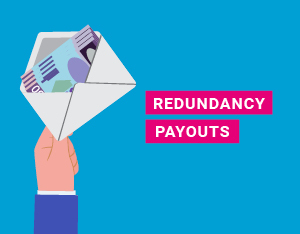Facing redundancy can be a stressful time, but knowing your rights and entitlements will help you navigate this difficult period.
Employment law specialist Jaenine Badenhorst from law firm Rainey Collins explains what you need to know about redundancy payouts.
Is everyone entitled to a redundancy payout?
“In New Zealand there is no automatic entitlement to redundancy compensation,” Badenhorst says. “However, you will always be entitled to a notice period, which sometimes is paid out in lieu of working out the notice period.” This can happen if the employment agreement allows the employer to do so, or if you and your employer both agree.
To see if you are entitled to redundancy compensation you should check your employment agreement.
Redundancy notice periods
“You will need to check your employment agreement to see what notice you may be entitled to,” Badenhorst advises.
Can I get more than the minimum amount?
Your employer can offer to pay you redundancy compensation when you are not otherwise entitled to any. “Your employer may also offer you more than you are otherwise entitled to,” Badenhorst says. “The types of situations where this might happen is where the employer wishes to thank a long serving or highly valued employee by giving them an additional ex gratia sum (or other benefit).”
Badenhorst notes that employers may also offer a larger redundancy payout where several employees are potentially facing redundancy. “A larger payout may serve as an incentive to encourage employees to take voluntary redundancy, so that the employer does not have to go through the entire redundancy process, or make the selection,” she says. “A larger payout can include other benefits too, for instance an extended notice period, additional time off work during the notice period to go for job interviews, a reference, recruitment support and so on.”
What is voluntary redundancy?
The redundancy process can be stressful for both employees and employers and Badenhorst says that voluntary redundancy can be offered to employees in order to bypass that stress. “In such a case, the employer can explain to potentially impacted employees that redundancy is likely for all or some of them, and then give employees the choice to avoid the process, and instead take voluntary redundancy,” she says. “Sometimes employers may offer a larger payout to those who opt for voluntary redundancy.”
Badenhorst emphasises that if you do not opt to take the voluntary redundancy, your employer can’t take any shortcuts in carrying out a fair redundancy process.
When are redundancies paid out?
Usually redundancy payouts are made with the final pay as a lump sum. “Parties may agree to pay it out over a period of time, for instance in accordance with the normal pay period, but this is less common,” Badenhorst says.
Redundancy terms and conditions
“Examples of ongoing obligations (connected to a redundancy payout) are the duty to keep client information confidential or to hand over all intellectual property,” Badenhorst says. “Where the employer is concerned that an employee may subsequently raise a grievance, it is recommended to put a record of settlement in place that records a full and final agreement around termination of employment.”
What you must know about redundancy
“The most important thing to know about redundancies, is that employers must have ‘good cause’ to make you redundant and they must follow a fair process in doing so,” Badenhorst says.
‘Good cause’ means that your employer has a legitimate reason for the redundancy (such as a downturn in sales, or selling or closing the business). “The employer cannot use redundancy as a way to get rid of a problematic or undesirable employee,” Badenhorst says. “Redundancy should relate to the position being surplus to the needs of the employer, rather than the characteristics of the employee.”
If your employer is refusing to make a redundancy payment where required, if you feel the process hasn’t been fair or if you have questions about redundancy payouts, you can contact your union (if you are a member) or an employment lawyer.
Information provided in this article is general only and it does not constitute legal advice and should not be relied upon as such. SEEK provides no warranty as to its accuracy, reliability or completeness. Before taking any course of action related to this article you should make your own inquiries and seek independent advice (including the appropriate legal advice) on whether it is suitable for your circumstances.



